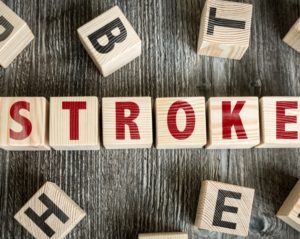 “I was so stressed out, I thought I was going to have a stroke!”
“I was so stressed out, I thought I was going to have a stroke!”
How many times have you heard someone say a version of the expression above? While it may often be said in jest, researchers have shown that the statement above may not be far from the truth.
According to the American Heart Association, higher levels of stress, hostility or depressive symptoms are associated with an increased risk of stroke or transient ischemic attack (TIA) in middle-aged and older adults.
A stroke occurs when blood flow and oxygen is blocked from getting to the brain – usually caused by a blood clot or broken blood vessel. When this happens, brain cells begin to die, and brain damage occurs. This can affect speech, movement and memory. A TIA is a stroke caused by a temporary blockage of blood flow to the brain.
Stroke is the leading cause of long-term disability and can happen to anyone at any time, regardless of race, sex or age.
While common risk factors of stroke such as high blood pressure, cholesterol and smoking have long been identified, research now shows that psychological factors might influence the risk for chronic disease. The research used data from the Multi-Ethnic Study of Atherosclerosis (MESA), an ongoing study on cardiovascular disease risk factors in participants living in six U.S. cities. It showed that participants who had the highest depressive symptoms, chronic stress and hostility (a negative way of viewing the world) scores were more likely to have a stroke or TIA. Specifically, compared to people with the lowest psychological scores, those with the highest scores were:
- 86 percent more likely to have a stroke or TIA for high depressive symptoms.
- 59 percent more likely to have a stroke or TIA for the highest chronic stress scores.
- More than twice as likely to have a stroke or TIA for the highest hostility scores.
What this study shows is that, along with traditional risk factors for stroke, psychological characteristics are important as well. We have to consider that these other factors might put us at risk for stroke, and anything we can do to reduce our risk for stroke is important.
Nowadays, being stressed is almost expected – like we’re not doing enough if we’re not trying to complete multiple tasks at once and racing from one activity to another. Now is the time to realize that being stressed isn’t a badge of honor we should be wearing. It truly can affect our health, so it would behoove us all to stop, re-evaluate what we’re doing and how we’re doing it, and try to find healthier ways to get through a day.
By Alan Berman, M.D.
Alan Berman M.D. is medical director at Mountain Valley Regional Rehabilitation Hospital.
Mountain Valley Regional Rehabilitation Hospital is a 40-bed, free-standing rehabilitation hospital that provides intensive physical rehabilitation services to patients recovering from strokes, brain, spinal cord, and orthopedic injuries, and other impairments as a result of injury or illness. For more information, visit MVRRH.ernesthealth.com.
3700 N. Windsong • Prescott Valley, AZ 86314 • (P) 928-759-8800• (F) 928-775-7781 • MVRRH.ernesthealth.com







